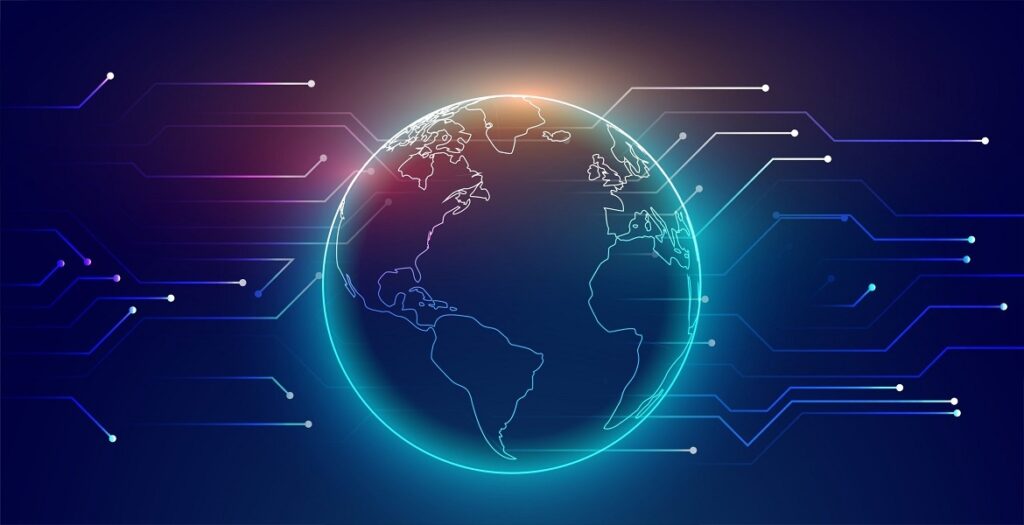Throughout history, the world’s balance of power has been dependent on the control and exploitation of critical resources.

In the 20th Century petroleum or so-called ‘black gold’ became supreme. It drove industrialization, shaped geopolitical alliances, and incited conflict everywhere in the world. Now, with the world entering a digital age, the impact is being replaced by the imminent rise of artificial intelligence (AI)—hailed as ‘digital gold’—as an axis of new global power. Whereas oil is natural, tangible, and found in specific locations on the planet, AI is data, a universal and boundless resource fueling innovation in every industry. From petro-politics to AI politics, this marks a new, deep reconfiguration of the architectures of global governance, economies, and security that reaches as far as the oil age.
The upsurge of oil as a bedrock in geopolitical scheming has been on course since the early 20th century, sparked by the process of industrialization and emergence of motorized means of transport. By the middle of the 20th century, oil was the lifeblood for economic development, military power, and technology. Worth was brought forth by the establishment of the Organization of Petroleum Export Countries (OPEC) in 1960, allowing countries’ oil production, as well as the consumption, to influence the control exerted over world supply and pricing. Key events, such as the embargo of 1973, amply testified to the power of oil over the disruption of economies and realignment of foreign policies.
Coming out clear in the seeming dominance, however, was petro politics difficulties. Often, resource-dependent countries have fluctuated in their economies and the “resource curse,” while environmental consequences of fossil fuel consumption have become increasingly evident. Oil reserves are finite, and renewable energy is being built up; this began to erode petroleum’s dominance in the global energy matrix as early as the twenty-first century. These factors heralded another age of geopolitics: that without oil, but with the imperial intangible and transformative force called artificial intelligence.
Though now oil has less influence, it still has a role to play in current international politics. Some oil-rich nations like Saudi Arabia, Russia, and the USA still manipulate oil production with strategic oil tools to influence global markets and keep energy security. It is now worth noting that a nexus between energy and politics occasions the conflicts over pipelines, the embargoes on oil exports, and the critical regions, such as the Persian Gulf. This global push toward sustainability, however, has all started to signal the decline of new investments in fossil fuels for the long run. It has instead started to indicate a change to cleaner energy sources and digital technologies in future.The change is going beyond oil-dependent economies to the whole geopolitical space as countries try to reposition themselves in a world where power is primarily data and artificial intelligence-driven influence.
AI, as a technology, is that of this revolution in the 21st century. With the value acquired from stemming oil wells by hand and provision, the value-acquirer of oil today derives from the endless flow of data in various parts of the world every year. Technology is concerned not so much about securing finite amounts of resources as about superior technology, data processing capability, intellectual property, and so on, in the battle between oil and the other.
AI is changing significantly into a more wider and diversified dimension; it activates autonomous systems and propels analytics in decision-making. Instead, it will uplift economies by maximizing more of existing industries in addition to creating newer markets. Countries thriving in this development of artificial intelligence would earn competitive advantages in most fields-from military applications to active health as far as innovation is concerned. Thus, it is not surprising to note that states and corporations have devoted considerable resources to research for supremacy in this regard, whether it’s in terms of infrastructure or talent acquisition.
This progressive dependence on AI has become politically important and has geopolitical consequences. Currently, the government and corporate systems, with their autonomous drones, influential analytics, and cyber capabilities, are defensively fighting the war of attrition.
Economically, it has also created new industries by completely disrupting old ones, making precision agriculture, personalized health, and smart manufacturing possible.
However, with dependence comes unforeseen hazards. Tension is aggravated by this as it is making monopolized tech giants afraid of division that may occur due to inequality. Distrust is elevated since it is inherently vague. Not to say that the entire weaponization of AI-from cyber-attack to disinformation campaign-does not put the world at risk. Hence some kind of dynamics lay out the two-edged nature of AI, as the force and the hostage. Us and China practically own about two-thirds of the world in artificial intelligence, but both have pretty much different modalities of innovation and governance.
The United States benefits from having a very robust private sector, and almost all the biggest technology companies-from Google, Amazon, and Microsoft-are part of it. To spearhead AI research and development, these companies use a culture of entrepreneurship and venture capital investment. While China pursues using the state as a lever to advance its AI ambition, issues of centralized state approach are to be seen in policies like the “Next Generation Artificial Intelligence Development Plan,” with the government investing heavily in research, infrastructure, and education.
China’s larger data ecosystem, enabled by a huge population and powerful surveillance infrastructure, presents the country a competitive edge over training AI models that are of an extraordinary scale.
Other nations, like the European Union, India, and Israel, are making strides in AI development. Ethical AI, for instance, focuses on the EU, while India aligns its focus on an IT-based emerging player. All these signal a recognition of AI as an important determinant of power in the future.
The power and sovereignty, the normal definitions of such terms, have gotten different meanings from the emergence of AI. Whereas oil had been the source of geopolitical power on a region-based physical control system, AI’s dependency is international and spread across a web of states, corporations, and non-state actors. This decentralizes political power and makes unique demands on governance, where multinational corporations have equivalent, if not greater, power than sovereign states.
Without doubt, the prominence of AI in defense strategies underlines the technology’s geopolitical importance. Speed, accuracy, and asymmetry would define future warfare with autonomous weapon systems, algorithmic targeting, and cyber capability. Collectively referring to “AI”, they provided increased capacities of monitoring by states but raised moral and ethical issues in privacy rights and human rights.
Races for AI superiority have also raised international tensions, especially between the US and China. Competition cuts across high-technology innovations to trade policies, talent search, and alliances. What makes this current split an even greater socio-cultural challenge in the emerging world is that the world is being pushed toward competing camps in a decidedly bifurcated digital ecosystem.
AI is economically changing the value chains around the globe and constructing new dependencies. Automation threatens traditional labor markets by displacing workers in agriculture, manufacturing, and services and yet generates opportunities in new high-tech areas such as data science and AI engineering. Governments are challenged with managing the balance between social equity and innovation. Concentration of AI advantages in a few countries only worsens the differences in the world over leaving what is called a “digital divide”.
Developing countries face the possibility of consuming technology from foreign countries and thus becoming part of an endless loop of dependency and marginalization. To bridge these gaps, international cooperation entails the transfer of technologies, building capacity, and equal access to the benefits of AI.
AI has made the strategic domains full of opportunities and risks. In cybersecurity, AI can bring sophisticated technology into the system to detect threats and incite advanced forms of cyber-attack. What undermines the trust in democratic institutions is the probability of an AI-facilitated disinformation campaign, while escalation and undesirable consequences are being feared due to weaponized algorithms. These are the dynamics which will create demand for governance frameworks under which the application of AI in conflict and security requires regulation. Like arms control treaties, multilateral agreements are required to create norms and prevent misuses. Such frameworks would ensure that while fighting competitive interests among states, corporations, and civil society, the use of AI would give a stabilizing effect and should not lead to disintegration.
Transitioning from black-gold to digital-gold signifies the historical milestone in the entire world marking the dawn of an age when data and algorithms replace the paramount influence in the novel exercise of power- oil. While AI has in place the best opportunity for innovation and advancement, it also presents exceptional challenges and opens its gate to emerging issues such as ethics and geopolitical rivalry. If this transformation has to happen, then nations must take proactive collaboration better and make more investments in education and research besides governance of unethical use.
Multilateral institutions should serve an essential role in trying to evolve and shape the international standards and equalities in trust. Stakes are heavy since the humongous sands of politics around AI will decide the future of global power, as well as the way and form of human progress in the 21st century. The lessons of petro-politics are thus still relevant in our new digital age, where there must be caution and foresight before responsibility towards potential oil and its impacts is taken. Adapting to the new world is going to be a challenge for ensuring that AI does not only give rise to a better future for all people but also makes it an equal and sustainable future.
Author: Rana Danish Nisar – Independent international analyst of security, defense, military, contemporary warfare and digital-international relations.
(The views expressed in this article belong only to the author and do not necessarily reflect the views of World Geostrategic Insights).







